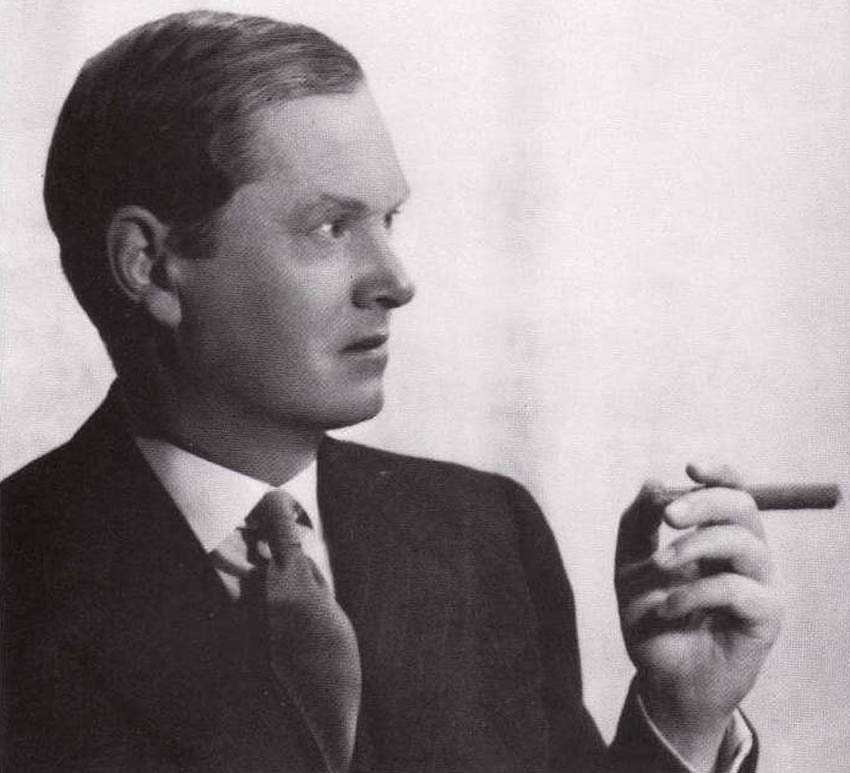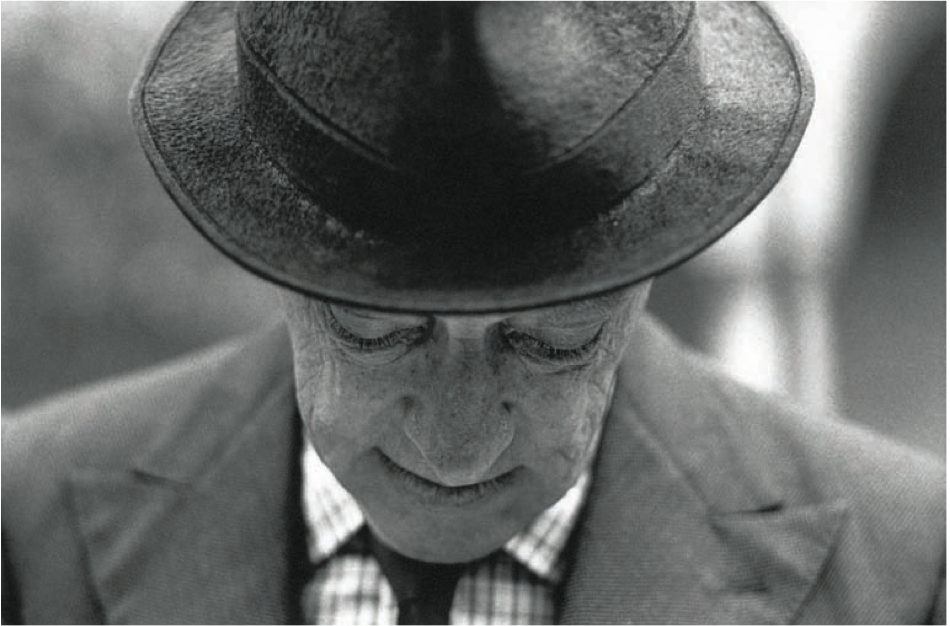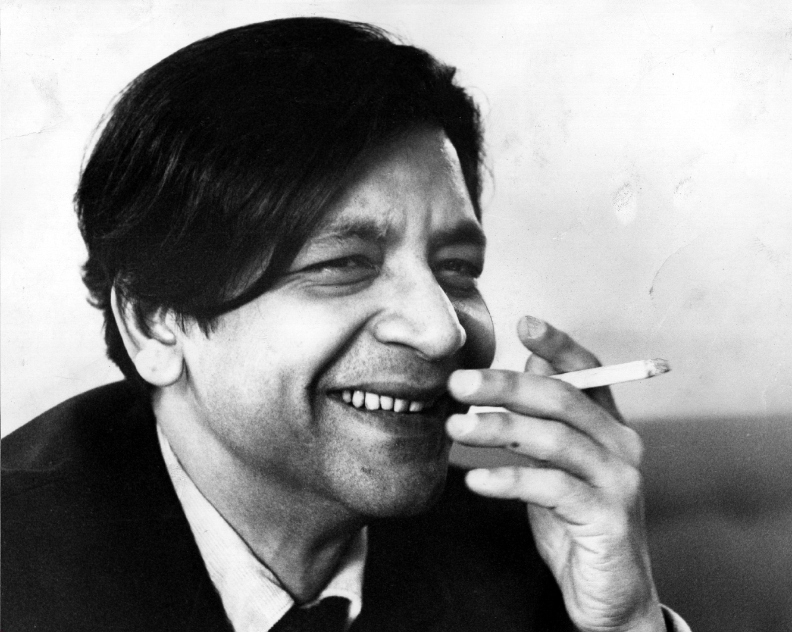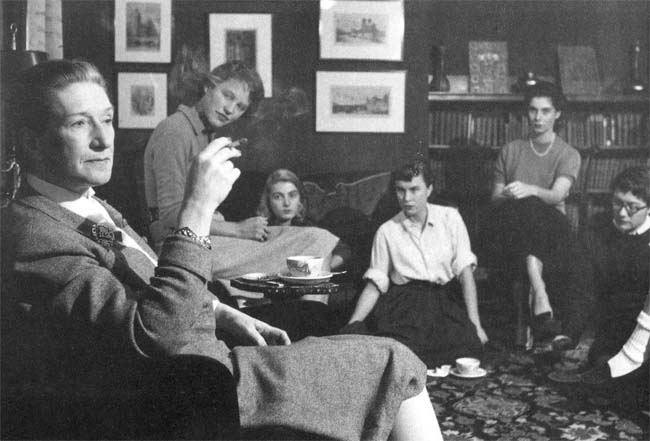(This is the twenty-first entry in the The Modern Library Reading Challenge, an ambitious project to read the entire Modern Library from #100 to #1. Previous entry: The Adventures of Augie March)
 Soak up enough art over the years and you’ll run into the cultural dichotomy, either through half-cocked introspection or cocktail party gunpoint. It’s a practice where two artists of equal merit and/or influence are positioned at opposing ends in talk, much as an oily advertising tyrant pins blindfolds on fat suburban heads to establish the next tasteless drink to slam down lacquered American throats.
Soak up enough art over the years and you’ll run into the cultural dichotomy, either through half-cocked introspection or cocktail party gunpoint. It’s a practice where two artists of equal merit and/or influence are positioned at opposing ends in talk, much as an oily advertising tyrant pins blindfolds on fat suburban heads to establish the next tasteless drink to slam down lacquered American throats.
The participant is forced to decide between two heavyweights. The answers are revealed among pals and peers, with shocked susurrations floating through the room like a toxic Yanni album, and the participant is put in a strange mode of defense. It is wrongly assumed that a devotee of one artist cannot possibly appreciate the other, and there are many words expended which slur the subtleties of artistic appreciation. But the practice does pass the time. In my twenties, I spent a minimum of 250 hours arguing with a Liverpudlian friend on Friday nights over Lennon vs. McCartney while sitting at a stop sipping Guinness from paper cups, awaiting the N Judah’s slow crawl up the hill into San Francisco’s empyrean drinking holes. Books were passed back and forth. Albums were played over and over, often at deafening levels. In hindsight, it’s astonishing how much musical and biographical minutiae we were able to summon up during these near rabbinical talks. I fear that I may be approaching similar levels of conversational twist with my partner, who is quite vocal about her Hammett preference while I argue strenuously for Chandler as the superior.
But here’s a cultural dichotomy likely to get me into trouble. I prefer P.G. Wodehouse over Evelyn Waugh, and this partiality, when announced, has had certain snobs declare me as a yob before I get the chance to articulate my reasons. While Wodehouse’s comic situations and character types tend to repeat over his 96 volumes (with such prolificity, how could they not?), there are few equals to the charm of his syntax, his lovable myopia to modern developments, his snazzy formality, and his genial silliness. Only a reader with an ass tighter than a hummer having a hard time with a parallel park would resist the artistic romance of the short story “The Man Upstairs” or the giddy premise of a portrait used to hypnotize the masses into eating ham in Quick Service, to say nothing of Jeeves or Blandings Castle. But the Modern Library magistrates, presumably viewing the good Pellham Grenville to be too light for their lofty criteria, decided there was no room for Wodehouse on the list. They gave three slots to a savagely precise stylist who cratered not long after the war. Wodehouse, as everyone knows, had a longer and steadier run.
So it’s quite aggravating to be forced, due to my orthodox commitment to this Modern Library countdown framework, to write about Waugh on the later novels first. My love for the early stuff is bountiful enough to avoid bringing up Wodehouse altogether. Just to be clear, if Lady Metroland shows up in a Waugh novel, it’s probably a winner. Yet because Brideshead Revisited is very much about clinging to what remains of older values and expired dreams, and because it sees Waugh hiding behind Charles Ryder looking back, if not in anger then from passive despair, as an excuse to belabor these points, I couldn’t help but think of Wodehouse’s comparatively freer manner as I sludged through this often beautiful and often maddening novel. Brideshead Revisited is also considerably more depressing if you happen to read it, as I did, shortly before hitting a birthday milestone in which that vile veneer between youth and middle age is decidedly closer to the latter and you are shuffling into inevitable adulthood while trying to find legitimate methods to retain youthful wonder.
I am writing a very beautiful book, to bring tears, about very rich, beautiful, high born people who live in palaces and have no troubles except what they make themselves and those are mainly the demons sex and drink which after all are easy to bear as troubles go nowadays.
That’s Waugh in a letter to Lady Dorothy Lygon in March 23, 1944, midway through the writing of Brideshead and shortly after a parachute accident. It’s likely he’s taking the piss out of the enterprise, for Waugh was not one to suffer fools (although he once suggested to Nancy Mitford that suffering fools was one of God’s happy responsibilities). He was up against wartime censors, spending much of his time soused out of his mind. Yet he was vehemently opposed to any efforts at Catholic reform. Some of these developments probably account for why Waugh was such a miserable bastard in his final years, and why his wartime efforts exacerbated the need to produce a magnum opus to match his prodigious intake of champagne.
It is safe to say that I did not shed a single tear for any of the assholes in Brideshead Revisited, although I was not without empathy. My salubrious contempt for people who bitch and moan when they have it all has been memorialized in several places, and I’m not likely to shake this quality anytime soon. It didn’t exactly enhance my reading experience when Charles Ryder, Waugh’s protagonist, was revealed to have the very exemplar of a free ride existence. Here is a Oxonian who lives beyond his means at school. Despite having a hearty coterie, a cushy spread, and a special friend named Sebastian Flyte (“we lit fat, Turkish cigarettes and lay on our backs”), Charles feels “at heart that this was not all that Oxford had to offer.” He complains about his neighbors, treats his servant Lunt with some disgrace, and ingratiates himself with Sebastian’s family, the Marchmains, who are “rich in the way people who are who just let their money sit quiet.” First World problems all the way.
When Charles stays with his father during the long vacation, Waugh does give us a number of masterfully executed comic moments. Charles’s father cannot comprehend that his son is short of funds, yet makes many cost-prohibitive suggestions on how a young man should live. He also has funny ideas of who “young people” are. There is the gloriously preposterous three-course dinner of humdrum quality, consumed “purely out of respect for your Aunt Philippa.” Charles’s father also manages to chase away Jorkins, one of Charles’s old acquaintances, by pretending he is American and extending this fantasy into a foolish belief that the young man will spend more time living at the family home.
Such idiosyncrasies can’t last forever. Charles receives a telegram from Sebastian that could almost serve as a six word memoir of their relationship (“GRAVELY INJURED COME AT ONCE, SEBASTIAN”), which sends Charles up to the famed Marchmain estate. The grave injury is reveled to be merely a cracked ankle bone. But the pretext leads Charles to “[believe] myself very near heaven, during those languid days at Brideshead.”
Sebastian encourages Charles to draw a fountain, a pivotal experience that lays down the flagstones for Charles’s career as an architectural painter. (He later finds uncommon success during a financial slump, publishing folios such as Ryder’s Country Seats, Ryder’s English Homes, and Ryder’s Village. But, of course, it’s the war that pushes him into glum vocational duty.) There is wine tasting, appreciation of Sebastian’s foibles (which include Catholicism and his teddy bear Aloysius), rooftop sunbathing, a trip to Italy on the Marchmain dime, and romance beneath the seams.
Not long after Italy, Sebastian is revealed as an alcoholic who requires constant attention, someone so out of control that he must be watched at all times and denied money that will surely keen its way onto a bar tab. It’s disheartening and telling that Sebastian’s dipsomania is portrayed by Charles as his most memorable quality. We are never fully informed of the dashing aspects which inspired their relationship because Charles can only reveal the true extent of his feelings through omission (and this isn’t limited to Sebastian: late in the book, when Charles has married, he is remiss to name his wife for an uncomfortably long stretch of pages). For all of Charles’s talk about memory, what is he leaving out? Has he actually learned anything?
“Inappropriate” relationships turn reductio ad absurdum when Julia, Sebastian’s sister, is engaged to marry an aspiring politico named Rex Mottram in high Catholic style. By this point, Sebastian has fled the family, besotted and quite in denial about his true feelings. Charles becomes smitten with Julia because she resembles her brother. But Rex puts the kibosh on the Catholic wedding when he reveals a secret first wife. So much for the covenant of lifelong matrimony. But Waugh doesn’t stop there. There’s a richly ironic moment when Brideshead, who is Sebastian’s older brother and has an Asperger’s-like affinity for matchboxes, finds an unlikely match and Catholic maxims are bended further.
The Catholic hold on how people should live reflects Charles’s own efforts to reckon with his present existence, which he forever compares against the past. Charles’s time with his father and the the deception Charles reveals later on a cruise ship (accompanied by some gleeful skewering of modern convenience by Waugh, including an ice swan filled with caviar and passengers who are so pampered into lax inattention that adulterous shenanigans become effortless) also illustrate the divide between old virtues and contemporary developments. But sometimes Charles’s belief in the past can be more insufferable than Jay Gatsby:
These memories, which are my life — for we possess nothing certainly except the past — were always with me….These memories are the memorials and pledges of the vital hours of a lifetime. These hours of afflutus in the human spirit, the springs of art, are, in their mystery, akin to the epochs of history, when a race which for centuries has lived content, unknown, behind its own frontiers, digging, eating, sleeping, begetting, doing what was requisite for survival and nothing else, will, for a generation or two, stupefy the world; commit all manner of crimes, perhaps; follow the wildest chimeras, go down in the end in agony, but leave behind a record of new heights scaled and new rewards won for all mankind; the vision fades, the soul sickens, and the routine of survival starts again.
To which I can only reply: lighten the fuck up. I’m as skeptical and as angry about news and developments as the next guy, but if you can’t find a happy belief in everyday magic and if you can’t reckon with relationships you should have pursued before the age of thirty-nine, maybe the problem is you. Would Charles have been happier if he had embraced candor and accepted the inevitability of change? Why does he have to be old and miserable?
Anthony Blanche, the Alfred Jingle knockoff who may be the most belabored character in all of Waugh’s fiction, is an uncloseted, flamboyant homosexual who serves as counterpoint to the secret and unspecified relationship between Charles and Sebastian. Waugh gives Blanche long speeches and “an unforgettable self-taught stammer” and has this annoying habit of being overly explicit about Blanche’s otherness:
At the age of fifteen, for a wager, he was disguised as a girl and taken to play at the big table in the Jockey Club at Buenos Aries…he had practice black art in Cefaluu; he had been cured of drug-taking in California and of an Oediups complex in Vienna.
and
He swept lightly across the room to the most prominent canvas — a jungle landscape — paused a moment, his head cocked like a knowing terrier…
Wodehouse never had to sell his readership on eccentricity this hard. On the other hand, perhaps Charles is describing Blanche this way because he is needlessly “proper.” Still, if Blanche can strong-arm his way into affluent and artistic circles, surely he’s more than just a freak. Maybe the truly depraved people are the ones who cling to normalcy like a spoiled boy holding his Gyro-Bot tight.
A mere eighteen months ago, I promised that I would respond to Lydia Kiesling’s notion of Evelyn Waugh as a “bi-curious hipster boyfriend.” So let’s get this out of the way. As of August 2012, Michael Cera’s career is in modest free fall: a benison for those of us who have long tired of his squeaky-voiced faux emo act. As of August 2012, there are still a few hipsters, although they are no longer taken seriously (not even by n+1). The smarter ones have moved to Portland or joined an Occupy movement or now write for The New Inquiry. But a sizable majority have transformed into obnoxious early thirtysomething layabouts who have no desire to grow up or grapple with serious issues, much less read an author who is challenging and/or not Caucasian. In their defense, some of them have been slammed hard by the 2008 recession and face chronic unemployment. But that’s still no excuse for slacking in the worst sense of the word.
Was Waugh a bi-curious hipster boyfriend? Not quite. He was a recovering hipster. Like any figure saddled by the deep need to abide by inflexible norms incompatible with the whims of life, he was torn and hungry and more than a little sad. But when it came to expressing his inner turmoil, he was willing to go to the mat and, like all great artists, give us plenty to talk about.
Next Up: E.M. Forster’s A Room With a View!




 For more than a decade, I have nursed a grandiose grudge towards Wallace Stegner that has less to do with the eco-friendly West Coast bigshot’s literary streetcred and more to do with my own irrepressible ineptitude concerning matters of the boudoir.
For more than a decade, I have nursed a grandiose grudge towards Wallace Stegner that has less to do with the eco-friendly West Coast bigshot’s literary streetcred and more to do with my own irrepressible ineptitude concerning matters of the boudoir. 
 There are so many unpardonable cruelties collected in Patrick French’s gripping (and authorized!) biography, The World Is What It Is, that it’s difficult to know where to start in condemning V.S. Naipaul’s boorish behavior, while also praising his prowess on the page. And yet I can’t quite do that either. I’ve read A Bend in the River twice, and I have to conclude that the book’s pat pronouncements about colonialism, even with the adept take on self-deception and willful naïveté, aren’t especially staggering. By the time the shopkeeper Salim shows his colleague Indar around the African town where he lives and reveals how little he knows (“All the key points of the town I knew could be shown in a couple of hours, as I discovered when I drove him around later that morning”), it was abundantly clear to me that he would never know.
There are so many unpardonable cruelties collected in Patrick French’s gripping (and authorized!) biography, The World Is What It Is, that it’s difficult to know where to start in condemning V.S. Naipaul’s boorish behavior, while also praising his prowess on the page. And yet I can’t quite do that either. I’ve read A Bend in the River twice, and I have to conclude that the book’s pat pronouncements about colonialism, even with the adept take on self-deception and willful naïveté, aren’t especially staggering. By the time the shopkeeper Salim shows his colleague Indar around the African town where he lives and reveals how little he knows (“All the key points of the town I knew could be shown in a couple of hours, as I discovered when I drove him around later that morning”), it was abundantly clear to me that he would never know. 
